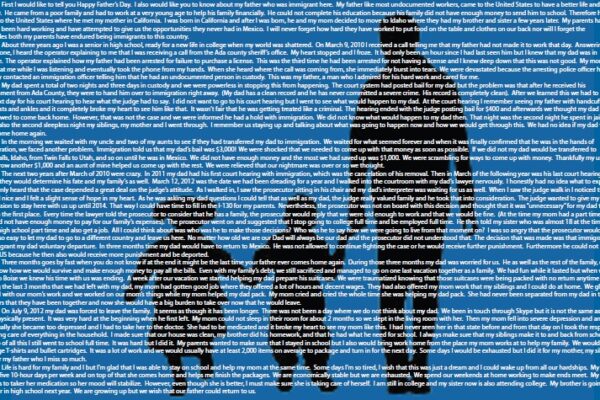By Bhavana Padiyath
Father’s Day was a somber event for thousands of children who have witnessed an immigrant parent being detained and deported from the country. Between July 1, 2010, and Sept. 31, 2012, there were over 204,810 such deportations involving mixed-status families with legal residents and children who are American citizens.
A group of such children from the Treasure Valley delivered large postcards to Senator Mike Crapo and Senator Risch on June 14th, urging their support for immigration reform legislation. They also presented each senator with 11 ties, a traditional Father’s day gift, representing the 1100 immigrants deported every day. This was part of a nationwide “Father’s Day is for Families” initiative to remind Congress and the Obama administration that family separations must end now.
The event was organized in Boise by the Coalition for Immigrant Rights of Idaho (CIRI) with support from the American Civil Liberties Union of Idaho to urge the legislators to vote in favor of the immigration reform laws making their way through Congress. The legislation proposes to make the road to citizenship accessible to millions of immigrants who have lived here for years and tried unsuccessfully – sometimes for decades – to become residents or U.S. citizens.
Neptali Mejia (21), a social work student, and her brother Pedro (16) described the emotional anguish and fear the family experienced when their father was deported to Mexico in 2012 after living in the U.S. for 22 years.
Pedro Mejia (41) worked quietly behind the scenes to support his family of five. He had no criminal record and was charged with a civil violation – his undocumented status.
Mejia now tries to start life anew as the owner of small shop in Taxco, Mexico. Meanwhile, his wife and three children struggle in the absence of a husband, father and breadwinner, without knowing when they might see him again.
Neptali recalls when her father was arrested in 2010 for driving without a license and handed over to the immigration authorities. “At the court hearing I remember seeing my father with handcuffs on his wrists and ankles and it completely broke my heart to see him like that. It wasn’t fair that he was getting treated like a criminal.”
The family borrowed from relatives to cobble together a bail of $3000 to prolong his presence in the country amidst a maze of court hearings until he was finally deported last year. Since then, Neptali’s mother, depends on medication to deal with severe anxiety and depression. Daily she brings home around 2,000 items for packaging from the industrial sewing plant where she is employed. Neptali and her siblings finish their homework and help their mother package T-shirts and bullet cartridges late into the night. “Some days I would be exhausted, but I did it for my mother, my siblings and my father who I miss so much.”
They communicate with their father through Skype and are not optimistic about being able to afford the expenses of visiting Mexico any time soon. “We want him home and we need him home,” says Neptali. “We are waiting, struggling and hurting”.
Estefania Mondragon of the ACLU-Idaho said in a statement, “Over the past several years, we have seen a civil rights crisis as divisive anti-immigrant laws have been enacted at the state level. When we have a class of immigrants who are viewed as having fewer rights, everyone’s civil liberties suffer. Family unity must be a vital part of any immigration reform legislation.”
Stay Informed
Sign up to be the first to hear about how to take action.
By completing this form, I agree to receive occasional emails per the terms of the ACLU’s privacy statement.
By completing this form, I agree to receive occasional emails per the terms of the ACLU’s privacy statement.

